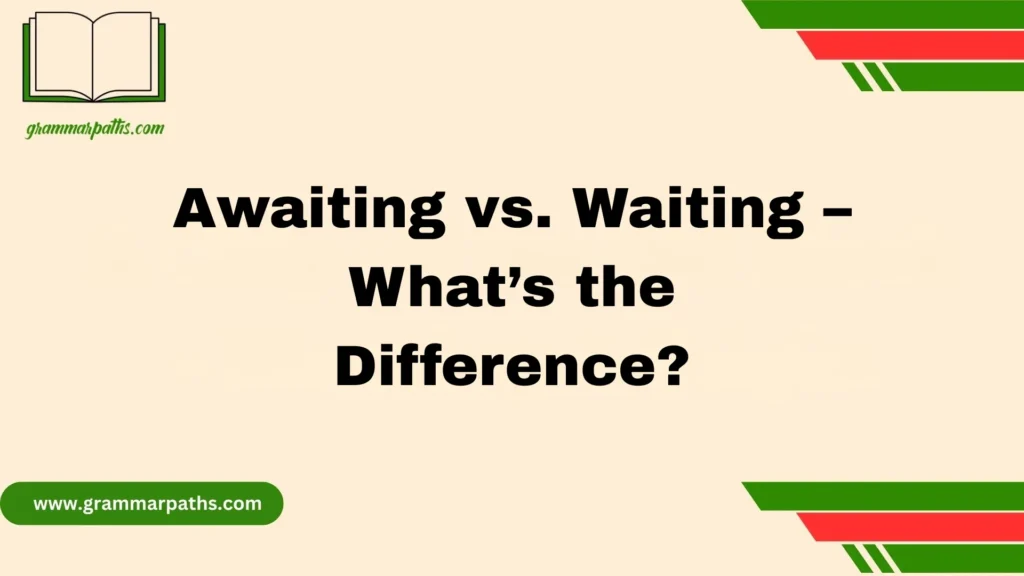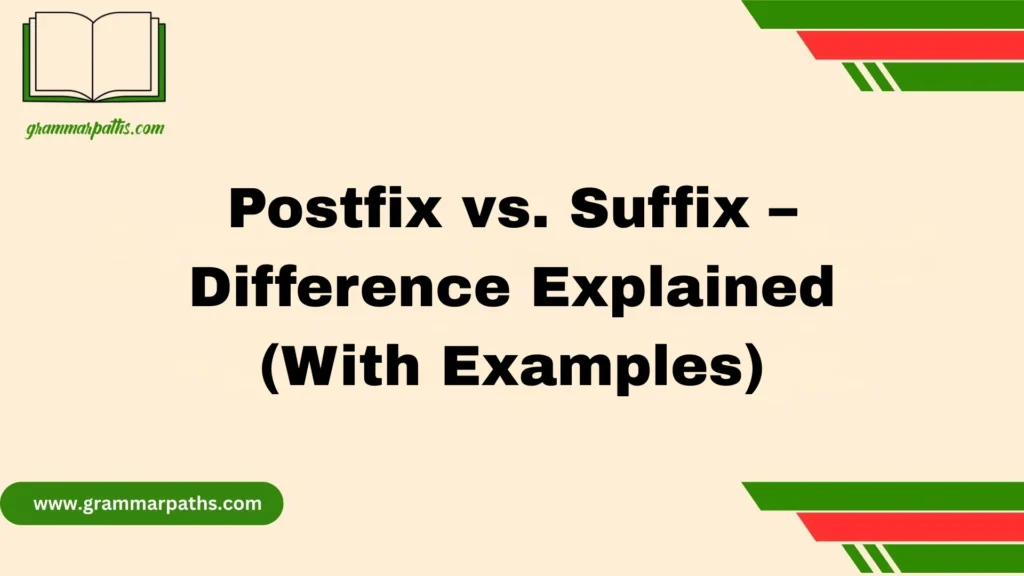Many English learners struggle with “prescribe” or “proscribe” because they sound similar but mean very different things. To prescribe something means to recommend or authorize it, often used in medical contexts—like a doctor who prescribes medication. On the other hand, to proscribe something means to forbid it, usually in legal or formal settings. For example, a law might proscribe certain behaviors.
People often search for the difference between prescribe and proscribe, looking for clear definitions, examples in a sentence, or a simple rule to remember them. Here’s a tip: think of “prescribe” as a positive action (recommend) and “proscribe” as a negative one (ban). These commonly confused words can lead to big mistakes, especially in writing, law, or medicine, so getting them right is key to clear communication.
Quick Answer: What’s the Difference Between Prescribe and Proscribe?
Before we dive deeper, here’s the simplest explanation:
| Word | Meaning | Tone | Example |
| Prescribe | To recommend or authorize something | Positive/Neutral | The doctor prescribed antibiotics. |
| Proscribe | To forbid or ban something | Negative | The law proscribes hate speech. |
Prescribe = recommend, advise, or authorize.
Proscribe = ban, outlaw, or condemn.
Even though they sound alike, they’re nearly antonyms. Their only similarity? A tendency to confuse writers and speakers alike.
Etymology: The Latin Roots Behind the Confusion
Both words come from Latin, which explains their similar appearance:
- Prescribe comes from praescribere, meaning “to write before” or “dictate”
- Proscribe comes from proscribere, meaning “to announce publicly (esp. banishment)”
The shared scribe root (“to write”) is the culprit. But the prefixes are key:
- Pre- = before or in advance (e.g., predict, preheat)
- Pro- = forward, outward, or for (in Latin proscribere, it took on a legal forbidding tone)
| Word Part | Meaning | Contribution to Word Meaning |
| Pre | Before | Suggests action in advance (e.g., advise) |
| Pro | Forward, outward | Suggests prohibition or declaration |
| Scribe | Write | Writing or declaring something |
So, while both involve “writing something down,” one is writing a rule to follow (prescribe) and the other is writing a rule against something (proscribe).
Prescribe: Meaning, Usage, and Real-World Examples
What Does Prescribe Mean?
Prescribe means to recommend, instruct, or officially authorize something, usually in professional settings like medicine, law, or policy.
Common Contexts
- Medical: Doctors prescribe medications, therapies, or lifestyle changes.
- Legal: A constitution may prescribe limits to executive power.
- Policy: Government bodies may prescribe rules for conduct or standards.
Examples in Sentences
- The physician prescribed a course of antibiotics for the infection.
- Regulations prescribe how much lead is allowed in drinking water.
- The teacher prescribed a specific reading schedule for the semester.
Synonyms of Prescribe
- Recommend
- Mandate
- Dictate
- Authorize
- Advise
- Order
Common Collocations
| Collocation | Meaning |
| Prescribe medicine | Authorize a specific drug or dosage |
| Prescribed by law | Legally mandated or required |
| Prescribed treatment | Official plan for recovery |
| Prescribing authority | Someone legally allowed to issue prescriptions |
Understanding this word ensures your message feels authoritative, structured, and solution-oriented.
Proscribe: Meaning, Usage, and How It’s Applied
What Does Proscribe Mean?
Proscribe means to forbid, condemn, or outlaw something, usually through legal or authoritative decree. It carries a more serious tone than ban or forbid.
Where It Shows Up Most
- Legal texts: Laws that proscribe activities such as bribery or money laundering
- Historical contexts: Ancient Rome used proscription lists to banish or execute enemies
- Political discourse: Nations proscribe terrorist organizations
Examples in Sentences
- The regime proscribed all independent news outlets.
- The company proscribes discrimination of any kind.
- Censorship laws often proscribe offensive content.
Synonyms of Proscribe
- Outlaw
- Ban
- Forbid
- Disallow
- denylist
- Prohibit
Common Collocations
| Collocation | Meaning |
| Proscribe by law | Officially outlawed |
| Proscribed behavior | Banned actions or conduct |
| Proscribed groups | Organizations forbidden by the state |
| Proscribing authorities | Entities responsible for enforcing bans |
The tone here is punitive and restrictive, unlike the constructive tone of prescribe.
Side-by-Side Comparison: Prescribe vs. Proscribe
Here’s a visual breakdown that highlights key contrasts:
| Feature | Prescribe | Proscribe |
| Definition | Recommend or authorize | Forbid or ban |
| Tone | Constructive, solution-oriented | Restrictive, disciplinary |
| Contexts | Medicine, law, education | Law, censorship, political control |
| Example | Prescribe medication | Proscribe hate speech |
| Similar Words | Recommend, authorize | Ban, outlaw |
| Root Word | Praescribere (to write before) | Proscribere (to write publicly against) |
Mini Quiz: Which Word Is Correct?
Choose prescribe or proscribe for each:
- The committee voted to ___ new safety procedures. (Prescribe)
- The court decision ___ the use of unlicensed software. (Proscribed)
- His religion ___ fasting during specific holidays. (Prescribes)
- The authoritarian regime ___ dissent and protests. (Proscribed)
Grammar Tips: How to Avoid Confusing These Two in Writing
Mnemonics That Work
- Prescribe: Think of a doctor writing a prescription (they recommend something).
- Proscribe: Think of a government putting something on a prohibited list.
Visual Cue
- Prescribe has an e, like encourage or enable
- Proscribe has an o, like outlaw or oppose
Memory Hack
“Prescribe helps; Proscribe prevents.”
Even grammar tools can get it wrong, so it’s crucial to know the context.
Real-World Case Studies: When the Wrong Word Caused Confusion
Case 1: Legal Brief Misuse
A junior attorney mistakenly wrote that the company “proscribed the use of arbitration,” intending to say “prescribed.” This altered the interpretation entirely, suggesting a ban rather than a recommendation. It had to be corrected in court filings.
Case 2: Government Health Memo
A government agency once released a memo stating it “proscribed masks in high-density areas,” which alarmed the public. They meant “prescribed.” The typo triggered media confusion and public backlash.
Case 3: Corporate Policy
In an HR handbook, a company said it “prescribes” offensive jokes. Employees were left confused until the word was corrected to “proscribes.”
These aren’t just spelling errors—they can have serious legal and reputational consequences.
Other Commonly Confused Word Pairs
These pairs cause similar trouble:
- Affect vs. Effect
- Imply vs. Infer
- Compliment vs. Complement
- Elicit vs. Illicit
- Principle vs. Principal
Each deserves its own deep dive to prevent mix-ups. If you’ve found this article helpful, check out our guide on Affect vs. Effect.
FAQs:
What are prescriptions and proscriptions?
Prescriptions are rules or recommendations for what should be done, often found in medicine or language. Proscriptions are rules or warnings about what must not be done, usually relating to laws, morals, or conduct.
What is proscriptive vs prescriptive?
Prescriptive approaches suggest or enforce what is considered correct or acceptable. Proscriptive approaches focus on forbidding or banning certain behaviors or usages. One promotes; the other prohibits.
What is the different meaning of prescribe?
“Prescribe” can mean to recommend a treatment, such as medication, or to set down rules or laws officially. It can also mean to dictate a course of action that should be followed.
What is an example of proscribe?
An example of proscribe is: The regime proscribed political protests. Here, it means to forbid or ban by law or rule.
What is the difference between elude and allude?
Elude means to escape or avoid something, often skillfully. Allude means to refer to something indirectly. For example, “He eluded capture” vs. “She alluded to her past.”
Conclusion:
Understanding the distinction between “prescribe” and “proscribe” is essential for clear and effective communication, especially in academic, medical, legal, and professional contexts. While these words share a similar structure and Latin origin, their meanings are nearly opposite. To prescribe is to recommend, authorize, or lay down a rule—often in the form of advice, instructions, or medication. In contrast, to proscribe is to prohibit, condemn, or outlaw something officially or by authority.
Misusing these terms can lead to serious miscommunication or even legal misunderstandings. Therefore, taking the time to understand each word’s precise definition, usage, and contextual application is not just about grammar—it’s about clarity and credibility.

Mia Rose is the passionate writer and founder of GrammarPaths.com, a resource dedicated to helping learners master English grammar, idioms, and writing skills with ease. With a deep love for language and years of experience in teaching and content creation, Mia simplifies complex grammar rules into clear, practical guides that readers can instantly apply.










